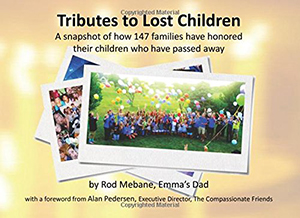[alert variation=”alert-info”]Publisher: Starshine Galaxy
Formats: Paperback
Purchase: Amazon[/alert]
There is no word in the English language for the parent who has lost a child; though a child who has lost a parent is an orphan and a spouse is a widow or widower, there is no word for the loss of a child. Whether it be an unsuccessful birth or a car accident, the death of a child is no less devastating if that child is 5 or 55. As this book shows, the word ‘child’ itself turns subjective where death is concerned, since the age at time of death is less relevant than the fact that there has been a loss. This slim volume explores that loss, and breaks down how 147 families dealt with the passing of their loved one, dealt with their grief, kept the departed present in their lives, made tribute to their memory, and created something positive from their loss.
Tributes to Lost Children is filled with compassion and grace, and could be a very powerful resource for a family that has lost a child, as this reviewer will attest. It is a very connecting book, and members of the “exclusive club” who have faced this particular agony will likely recognize their own grief and impulses in these pages—such as a desire to make a place in the house where that child can still exist, or at least be remembered. Grief can be a very connective process, showing us just how many experiences we share with those around us. As the parents, siblings, and loved ones left behind to grieve the what-might-have-beens, this book illustrates that there is little else in life so agonizing.
Author Rod Mebane does what he says he does best in this book: simplifies complex things. Grief and loss are nothing if not complex, losing a child even more so. This is not a manual on how to grieve, how to heal, or anything so simple. Instead, it is a collection of experiences, of tributes, of memories, a light in the darkness to show the bereaved parent that they are not alone, that their impulses are felt by others, to give them ideas for ways to pay tribute, an affirmation that it is all right to keep lost children present, to remember them, and to strive for some good to be gained from their loss. Most of all, this book underlines one very important truth: bereaved families want to remember, they want to honor their lost children, and they want them to be remembered.
[signoff predefined=”Sponsored Review Program” icon=”book”][/signoff]

